Student profile: REU participant Caitlin
by Caitlin Fikes (VIMS summer 2012 REU student)
Greetings, fellow sea-lovers! My name is Caitlin Fikes, and I’m thrilled to be part of the ZEN family. I am an undergraduate student participating in the National Science Foundation’s REU (research experience for undergraduates) program this summer at VIMS. I’ve been asked how I became involved in the ZEN project and the type of background that makes for a competitive REU applicant. To answer that, let me tell you a little about myself.
I was born in the fine state of Virginia, although for all intents and purposes, this summer was the first time I’ve been here. Growing up my family felt the need to move when the wind changes; we breezed through Virginia and onto another state before I was old enough to remember a thing. I grew up in various states, and developed a love for change and travel and new experiences. I’ve never regretted my vagabond childhood for an instant, and I don’t intend to ever stop moving.
I have always loved nature and wildlife. As a child, I read every book on animals that I could get my hands on, and spent my days traipsing through the woods looking for snakes or deer tracks. But I didn’t know what direction I specifically wanted to go. I loved all nature, all animals, everywhere. When I was fifteen, I acquired my SCUBA certification, and it became very clear to me that I belong in the marine world. I resented the human limitations that required me to eventually come back to the surface for air. I would have remained underwater forever if I could, exploring and observing quite happily. My dream of becoming a marine biologist was born.
Other than obtaining the SCUBA certification itself, I took my first real step towards my dream in 2009, the summer before my senior year of high school. My family was living near Omaha, Nebraska, at the time, and the Henry Doorly Zoo in Omaha was offering a summer “Eco-Adventure” course. The program consisted of first working with various animals at the Zoo for two weeks, and then culminated in a week-long trip to Cozumel, where the group would be researching coral reefs and snorkeling alongside migrating whale sharks. Barely able to contain my excitement, I applied and was accepted. Caring for a myriad of different animals at the Zoo was extremely informative and fun, but when it came to my marine biology dream, the week in Cozumel sealed the deal for me.
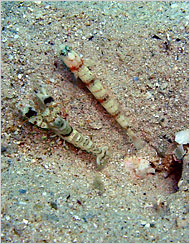
An example of the goby and shrimp pair (courtesy: Operation Pufferfish). To learn more, check out this NY Times page
And it wasn’t just about the charismatic megafauna; the dolphins and whale sharks were fantastic and all, but the highlight of the trip for me was discovering a tiny shrimp/goby pair while diving on the coral reef. I had read about the mutualistic relationship shared by shrimps and gobies, in which the blind shrimp digs a burrow for both to live in and the goby becomes a lookout and bodyguard. I thought it was incredible. To see a pair in the wild was exhilarating. The entire experience felt like a green light to pursue this ambition.
As soon as I returned from Cozumel, I used my connections from the program to obtain a volunteer internship at the Omaha Zoo’s Scott Aquarium. Throughout my entire senior year of high school, I spent every available hour at the aquarium, caring for and learning about the animals there, as well as observing the aquarium’s ongoing research. I learned that the Scott Aquarium was one of the first institutions in the world to successfully raise sexually produced elkhorn coral (Acropora palmata) polyps, a very important and highly threatened species of coral. To be so close to the cutting edge of marine biology research was an awesome opportunity; but I was eager to actually jump in and get my feet wet.
I began my college career at the University of Miami in 2010, double majoring in biology and marine science, and double minoring in chemistry and environmental science. Miami has given me a thorough grounding in biology, chemistry, and physics, with emphasis on marine science and exposure to incredible field and research experience probably not available to universities elsewhere. By the end of only two years as an undergrad, I had participated in field studies in coral reefs, seagrass beds, and mangrove forests. I had helped catch and attach satellite tags to pelagic sharks. I had even started my own research project looking at the effects of a common herbicide on the embryonic development of sea urchins, which I will be continuing in the fall. And, in my spare time, I became certified to assist in rescuing stranded marine mammals.
Throughout this time, I also began to better define my interests and which direction I wish to take in marine biology. I became interested in marine conservation biology, especially in light of the current global fisheries crisis. But even more than that, I am interested in how changes in a particular species can affect the entire ecosystem. What is the nature and strength of the many connections between species? How does tugging one strand shake the food web? And how do the non-biological elements factor into the equation? I realized that what I want to become is actually a marine ecologist.
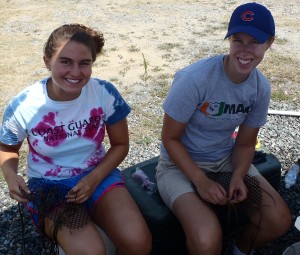
Undergraduates Nicole Rento (left) and Caitlin Fikes (right) prepare materials for a field experiment
Which brings me to this summer. Knowing that I wanted to do research, both to get more experience and to meet the people in my chosen field, I applied to the REU (Research Experience for Undergraduates) program here at VIMS. I was surprised and delighted to receive a call from Dr. Pamela Reynolds. When she told me that she felt I was a good fit for the Marine Biodiversity Lab under Dr. Emmett Duffy, I was honored, ecstatic, and extremely nervous!
Virginia and the Chesapeake Bay are gorgeous, VIMS is an incredible institution, and the members of the lab are both great people and great scientists. I would love to be able to follow in the footsteps of the skilled scientists who came before me, and every time we go flying out over the York River to our field sites for another fun day of science and adventure, I can’t help but feel that I’m on the right track.
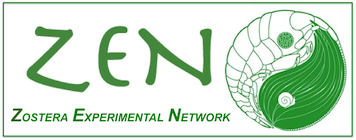
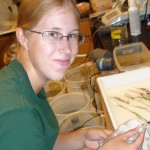
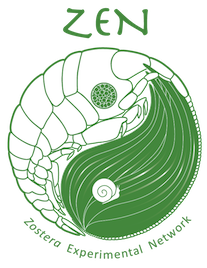
Comments are closed.